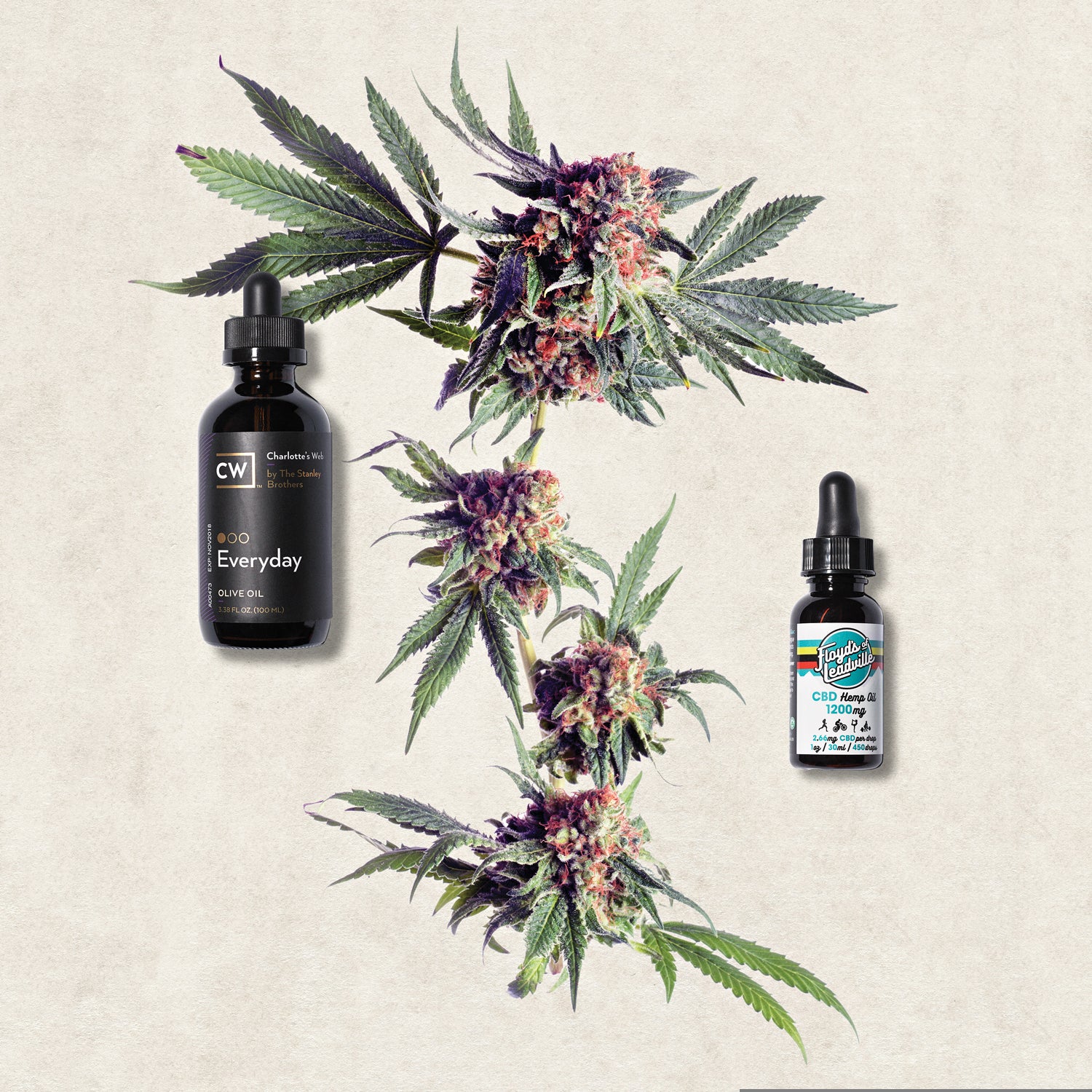Andrew Talansky is almost always sore. The 29-year-old spent seven years as a professional cyclist racing for Slipstream Sports. He recently switched to triathlon and now spends hours training both on and off the bike. “I’m using muscles I haven’t used in years,” Talansky says. “My body is constantly inflamed.” Many athletes in his situation rely on common pain relief like ibuprofen, but when Talansky strained a hip flexor last fall, he reached for a bottle of cannabidiol (CBD), an extract from the cannabis plant, instead.
“I took it for a couple of weeks, and there was a noticeable difference immediately,” Talansky says. “And it wasn’t just that my hip was feeling better. I was less anxious, and I was sleeping better.”
Marijuana has long been considered an alternative pain medication, with THC, the principle psychoactive compound in the plant, getting most of the attention. CBD is another active component and could offer some of the same medical benefits (anti-inflammatory, anti-anxiety, analgesic), but without the side effect of getting high. CBD interacts with serotonin and vanilloid receptors in the brain, which affect mood and the perception of pain. It also has antioxidant properties. The World Anti-Doping Agency (WADA) removed CBD from its list of banned substances in January, which prompted many professional athletes, including ultrarunner Avery Collins and mountain biker Teal Stetson-Lee, to eschew ibuprofen for CBD. Some believe it’s a safer alternative to drugstore pain relievers and anti-inflammatories.
More than a dozen countries have CBD-based medications on the market, including Canada and Israel, but in the U.S. advanced clinical trials are still in their infancy.
Research on CBD has been slow to accumulate, largely because the federal government considers marijuana a Schedule I drug—the same classification given to heroin and LSD—making it difficult for researchers to gain access to it for study. And because many states have already legalized the drug for medical use, pharmaceutical companies have little incentive to conduct costly clinical trials demonstrating its efficacy. (CBD remains illegal in several states that have yet to pass medical-marijuana or CBD exemptions.)
Still, the market for CBD is booming. According to a study by the Brightfield Group, a market-research firm based in Tampa, Florida, hemp CBD generated $170 million in revenue in 2016. With annual sales growing at a rate of 55 percent, it’s poised to be a $1 billion industry by 2020. Charlotte’s Web, which bottles the extract in Colorado, is one of the largest producers in the industry. Talansky’s CBD of choice comes from Floyd’s of Leadville, also in Colorado, which was launched in 2016 by former pro cyclist Floyd Landis. Floyd’s of Leadville markets its products directly to athletes looking for a natural recovery supplement. “Think of your 40-year-old endurance athlete who wants to feel good when he wakes up in the morning,” Landis says. “That’s our target.”
Landis uses CBD to manage pain from a hip replacement he had in 2006. He relied on WADA-approved opioid-based painkillers for years, both before and after he was stripped of his 2006 Tour de France victory for using synthetic testosterone. Eventually, Landis leaned on pot smoking to kick his opioid habit, and in 2015 a friend in the burgeoning marijuana industry suggested Landis try CBD instead.
“It’s the only thing I use now,” Landis says. “I try not to oversell it, because I don’t want to sound insane. But if you can stop taking other pain medications, if you have a natural solution, that’s probably the better option.”
There is research to back up his enthusiasm. A 2008 review by GW Pharmaceuticals examined two decades’ worth of preclinical studies and animal trials before concluding that CBD can be a successful tool for pain management without many adverse side effects. A 2016 study by the University of Kentucky examined CBD’s effects on arthritic rats and found that the compound reduced inflammation and overall pain. Some studies have also labeled it a neuroprotectant, suggesting that it has the ability to bolster the brain against the damaging effects of concussion. More than a dozen countries have CBD-based medications on the market, including Canada and Israel, but in the U.S. advanced clinical trials are still in their infancy.
“There is overwhelming evidence that CBD can be effective for mitigating pain,” says Jahan Marcu, chief science officer with Americans for Safe Access, which works to legalize medical marijuana. “But we haven’t seen the full clinical trials necessary to understand exactly how it works.”
Prospective CBD users should keep in mind that the scientific community still has a lot to learn about the drug. For instance, there have been no studies on recommended dosage for a given ailment. There’s also no scientific consensus about how effective CBD is compared with anti-inflammatories like ibuprofen or naproxen. That could change soon: at least 20 clinical trials examining the medical benefits of CBD are currently under way in the U.S., including a $16 million effort by the University of Miami, which is looking into CBD’s effects on brain trauma.
Beyond these questions, there’s also growing concern about the quality of the products currently for sale. Because the federal government considers CBD an illegal drug, the industry is underregulated by the FDA, with little third-party oversight. A 2017 study published in The Journal of the American Medical Association found that 69 percent of the CBD products tested didn’t contain the amount of cannabidiol indicated on the label. Most CBD companies don’t sell through retail outlets; they reach consumers online.
“You can’t really trust what you’re buying over the Internet,” says Ryan Vandrey, who researches cannabis at Johns Hopkins University and coauthored the 2017 JAMA study. “After purchasing every CBD oil you could buy, we found that a number of companies were selling products that contained almost no cannabidiol, and others contained THC.”
While there are many unknowns, anecdotal and preclinical evidence for the efficacy of CBD continues to build. Vandrey is conducting an ongoing survey of more than 1,000 users of marijuana products, many of them with CBD, and his initial findings suggest that the majority have seen overall improvement in terms of pain relief, sleep satisfaction, and anxiety reduction, though the cause remains unclear. And a growing number of athletes like Talansky believe that aiding recovery without the long-term side effects of ibuprofen (such as increased risk of heart failure) or the addictive qualities of opioids is a step in the right direction. “I haven’t taken an Advil in months,” Talansky says. “For any athlete who trains hard, that’s saying a lot.”
Before You Buy
The lack of industry standards can make purchasing CBD risky. If you plan on stocking up, here are some basic questions to keep in mind.
- Is it legal where you live? Most states have passed some medical marijuana or CBD exemptions, but it’s completely illegal in four states: Idaho, South Dakota, Nebraska, and Kansas.
-
Has it been tested by a third party? Independent labs check for potency, pesticides, and residual solvents. If the company doesn’t list these results, move on.
-
Does the company make unsubstantiated claims? CBD has not been proven to kill cancer cells, halt Alzheimer’s, or treat schizophrenia. Avoid products that promise to cure everything that ails you.


